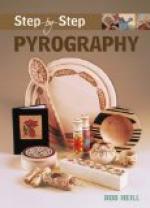Years before a company of twelve monks and a Prior had come there to found a religious house. They brought from England an arklike chest containing some manuscript books, and relics, chalices, candlesticks and other treasures, and little else except their long black robes, girdles and sandals. These monks, working in orderly and diligent fashion under their superior’s direction, had built a chapel, a dormitory, a dining-hall, store-houses, barns,—and the community grew. The building was done first of rough stone and wattle-work after the manner of the country, but later of good cut stone. Half the countryside had been employed there when the chapel was building. They had drained the marsh for their meadow-land, their young trees were growing finely, their vineyard was thriving in a sunny selected nook, their sheep flecked the hills all about them. A deep fish-pond had been made where now two monks sat fishing. Padraig wondered if they had caught anything as good as the lithe trout he had taken from a mountain stream.
He was hungry, for he had been afoot since daylight, and he was wondering whether to make a fire and cook his trout or offer them to the monks in exchange for a supper. The wind that blew from the eight-side cone-roofed kitchen brought to his nostrils a smell so delicious that he was drawn like a fish on a line to the gates of the abbey.
He had met wandering monks and friars, but this was the first abbey he had entered. When he knocked at the gate and the porter asked him what he wanted, he was a little excited and rather scared.
But the porter, although rheumatic and grumpy, knew good fish when he saw them, and considered them just the thing for the Abbot’s supper. He let Padraig in by the wicket gate, the door with a grating in it set in the big door and only about a third as large. Soon the boy was sitting by the kitchen fire eating a bowl of the most delicious broth he had ever tasted. Round-faced Brother Hilarius, who had charge of the kitchens, was in so good a humor over the trout that he suggested to Padraig that he might herd sheep for the Abbey. The monks did a great deal of the work about their farms and in their workshops themselves, but there was still much to do, and they were usually willing to give work to anybody who did not ask for more than food and lodging.
Padraig liked the Abbey, but he would probably have gone on before very long had he not found something which interested him more than anything else ever had. Brother Sebastian, the head shepherd, sent him one day to a part of the buildings he had not before seen. The long stone-walled, stone-floored room had little stalls down one side, each with its wooden bench and reading-desk. On one of these desks lay open the first book Padraig had ever seen.
It was not printed, but written, each letter carefully drawn with a quill pen. The initials of the chapters, and the border around each page, had been painted in an ornamental design like a tangle of leaves and vines, in bright red, green, yellow, brown, black, blue. Twisted vines bore fruits, flowers, tiny animals and birds, here and there a saint, angel or cherub. The monk who was doing this illuminating was too much absorbed in his work to know that any one had come in, at first. When he looked up and saw Padraig standing there he smiled very kindly.




